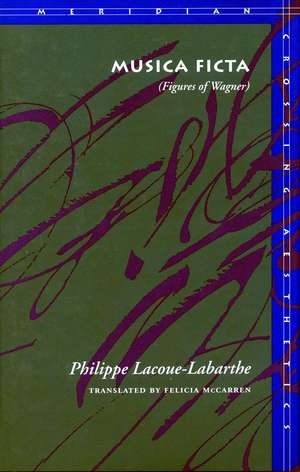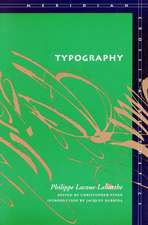Musica Ficta: (Figures of Wagner): Meridian: Crossing Aesthetics
Autor Philippe Lacoue-Labartheen Limba Engleză Hardback – 31 ian 1995
This is a pioneering attempt to rearticulate the relationship between music and the problems of mimesis, between presentation and re-presentaion. Four "scenes" comprise the book, all four of them responses to Wagner: two by French poets (Baudelaire and Mallarme), two by German philosophers (Heidegger and Adorno).
It is dificult to realize how profoundly Wagner affected the cultural and ideological sensibilities of the nineteenth century. Wagnerism rapidly spread throughout Europe, partly because of Wagner's propagandizing talent and the zeal of his adherents. But the main reason for his ascendance was the sudden appearance of what the century had desperately tried to produce since the beginnings of Romanticism - a work of art on the scale of great Greek and Christian art. At last, here it was: the secret of what Hegel called the "religion of art" rediscovered.
The first two scenes of the book present a historical sequence that is punctuated by the Franco-Prussian War and the Paris Commune, in which the universal unbridling of nations and classes is prefigured. The second two register certain effects of Wagnerism that are not just ideological but make themselves felt in a new political configuration of the "national" and the "social."
It is dificult to realize how profoundly Wagner affected the cultural and ideological sensibilities of the nineteenth century. Wagnerism rapidly spread throughout Europe, partly because of Wagner's propagandizing talent and the zeal of his adherents. But the main reason for his ascendance was the sudden appearance of what the century had desperately tried to produce since the beginnings of Romanticism - a work of art on the scale of great Greek and Christian art. At last, here it was: the secret of what Hegel called the "religion of art" rediscovered.
The first two scenes of the book present a historical sequence that is punctuated by the Franco-Prussian War and the Paris Commune, in which the universal unbridling of nations and classes is prefigured. The second two register certain effects of Wagnerism that are not just ideological but make themselves felt in a new political configuration of the "national" and the "social."
| Toate formatele și edițiile | Preț | Express |
|---|---|---|
| Paperback (1) | 172.13 lei 3-5 săpt. | +9.51 lei 4-10 zile |
| Stanford University Press – 31 ian 1995 | 172.13 lei 3-5 săpt. | +9.51 lei 4-10 zile |
| Hardback (1) | 699.02 lei 6-8 săpt. | |
| Stanford University Press – 31 ian 1995 | 699.02 lei 6-8 săpt. |
Din seria Meridian: Crossing Aesthetics
-
 Preț: 78.35 lei
Preț: 78.35 lei -
 Preț: 227.94 lei
Preț: 227.94 lei -
 Preț: 232.81 lei
Preț: 232.81 lei -
 Preț: 226.40 lei
Preț: 226.40 lei -
 Preț: 164.45 lei
Preț: 164.45 lei -
 Preț: 271.73 lei
Preț: 271.73 lei -
 Preț: 249.82 lei
Preț: 249.82 lei -
 Preț: 279.44 lei
Preț: 279.44 lei -
 Preț: 199.10 lei
Preț: 199.10 lei -
 Preț: 258.64 lei
Preț: 258.64 lei -
 Preț: 149.49 lei
Preț: 149.49 lei -
 Preț: 231.67 lei
Preț: 231.67 lei -
 Preț: 142.73 lei
Preț: 142.73 lei -
 Preț: 172.13 lei
Preț: 172.13 lei -
 Preț: 146.40 lei
Preț: 146.40 lei -
 Preț: 139.64 lei
Preț: 139.64 lei -
 Preț: 228.39 lei
Preț: 228.39 lei -
 Preț: 138.82 lei
Preț: 138.82 lei -
 Preț: 227.71 lei
Preț: 227.71 lei -
 Preț: 148.45 lei
Preț: 148.45 lei -
 Preț: 127.27 lei
Preț: 127.27 lei -
 Preț: 224.41 lei
Preț: 224.41 lei -
 Preț: 139.42 lei
Preț: 139.42 lei -
 Preț: 210.00 lei
Preț: 210.00 lei -
 Preț: 203.47 lei
Preț: 203.47 lei -
 Preț: 154.20 lei
Preț: 154.20 lei -
 Preț: 159.75 lei
Preț: 159.75 lei -
 Preț: 224.41 lei
Preț: 224.41 lei -
 Preț: 149.68 lei
Preț: 149.68 lei -
 Preț: 196.44 lei
Preț: 196.44 lei -
 Preț: 210.00 lei
Preț: 210.00 lei -
 Preț: 111.58 lei
Preț: 111.58 lei -
 Preț: 168.96 lei
Preț: 168.96 lei -
 Preț: 250.69 lei
Preț: 250.69 lei -
 Preț: 172.95 lei
Preț: 172.95 lei -
 Preț: 138.60 lei
Preț: 138.60 lei -
 Preț: 147.22 lei
Preț: 147.22 lei -
 Preț: 150.72 lei
Preț: 150.72 lei -
 Preț: 141.28 lei
Preț: 141.28 lei -
 Preț: 216.48 lei
Preț: 216.48 lei -
 Preț: 252.92 lei
Preț: 252.92 lei -
 Preț: 191.39 lei
Preț: 191.39 lei -
 Preț: 227.27 lei
Preț: 227.27 lei -
 Preț: 169.42 lei
Preț: 169.42 lei -
 Preț: 147.85 lei
Preț: 147.85 lei -
 Preț: 204.32 lei
Preț: 204.32 lei -
 Preț: 150.72 lei
Preț: 150.72 lei -
 Preț: 207.82 lei
Preț: 207.82 lei -
 Preț: 162.67 lei
Preț: 162.67 lei
Preț: 699.02 lei
Preț vechi: 862.98 lei
-19% Nou
Puncte Express: 1049
Preț estimativ în valută:
133.75€ • 139.66$ • 110.45£
133.75€ • 139.66$ • 110.45£
Carte tipărită la comandă
Livrare economică 15-29 aprilie
Preluare comenzi: 021 569.72.76
Specificații
ISBN-13: 9780804723763
ISBN-10: 0804723761
Pagini: 188
Dimensiuni: 152 x 229 x 18 mm
Greutate: 0.39 kg
Ediția:1
Editura: Stanford University Press
Colecția Stanford University Press
Seria Meridian: Crossing Aesthetics
ISBN-10: 0804723761
Pagini: 188
Dimensiuni: 152 x 229 x 18 mm
Greutate: 0.39 kg
Ediția:1
Editura: Stanford University Press
Colecția Stanford University Press
Seria Meridian: Crossing Aesthetics
Recenzii
"This is a remarkable book. Not since Theodor Adorno has a theoretical work approached music in as broad, incisive and provocative a way as does Lacoue-Labarthe's Musica Ficta. The book opens up an entirely new perspective for reinterpreting the relations between music, theater, literature, and the philosophical-aesthetical tradition that has largely governed our understanding of those media. For the first time, to my knowledge, recent analyses of representation are brought to bear on the function of music, revealing its particular affinities to theatricality. Musica Ficta breaks new ground."—Samuel Weber, University of California, Los Angeles
"A remarkable book. Not since Theodor Adorno has a theoretical work approached music in as broad, incisive, and provocative a way. The book opens up an entirely new perspective for reinterpreting the relations between music, theater, literature, and the philosophical-aesthet ic tradition that has largely governed our understanding of those media."—Samuel Weber, University of California, Los Angeles
"Lacoue-Labarthe's work is a thought-provoking book: the reader embarks on an intellectual journey that draws connections between music, theater, aesthetics, philosophy, and history from ancient Greece to the present. . . . Lacoue-Labarthe offers a point of departure for a new aesthetic of art, one appropriate to the philosophical problems of the 20th Century."—Wagner Notes
Textul de pe ultima copertă
“This is a remarkable book. Not since Theodor Adorno has a theoretical work approached music in as broad, incisive and provocative a way as does Lacoue-Labarthe’s Musica Ficta. The book opens up an entirely new perspective for reinterpreting the relations between music, theater, literature, and the philosophical-aesthetical tradition that has largely governed our understanding of those media. For the first time, to my knowledge, recent analyses of representation are brought to bear on the function of music, revealing its particular affinities to theatricality. Musica Ficta breaks new ground.”—Samuel Weber, University of California, Los Angeles
“A remarkable book. Not since Theodor Adorno has a theoretical work approached music in as broad, incisive, and provocative a way. The book opens up an entirely new perspective for reinterpreting the relations between music, theater, literature, and the philosophical-aesthet ic tradition that has largely governed our understanding of those media.”—Samuel Weber, University of California, Los Angeles
“A remarkable book. Not since Theodor Adorno has a theoretical work approached music in as broad, incisive, and provocative a way. The book opens up an entirely new perspective for reinterpreting the relations between music, theater, literature, and the philosophical-aesthet ic tradition that has largely governed our understanding of those media.”—Samuel Weber, University of California, Los Angeles
Descriere
This is a pioneering attempt to rearticulate the relationship between music and the problem of mimesis, of presentation and re-presentation. Four "scenes" compose this book, all four of them responses to Wagner: two by French poets (Baudelaire and Mallarmé), two by German philosophers (Heidegger and Adorno).











